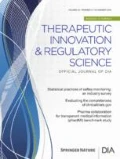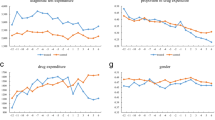Abstract
In Taiwan, some hospitals reward physicians through financial incentive plans linked to the amount of revenue generated by the drugs they prescribe to patients. This study investigates whether the prescription behavior of physicians impacts the implementation of the government’s drug price adjustment policy, which reduces the amount of reimbursement for certain drugs. Our objective is to determine if the policy is effective. To this end, we consider the drugs prescribed to a specific category of patients, namely, hospital outpatients aged 65 and above with hypertension. Between December 1999 and July 2000, approximately 468,000 prescriptions were issued to such patients. First, we used regression analysis to examine the effect of financial incentives offered to physicians on drug utilization after the implementation of the drug price adjustment policy. Then, we employed a probit model to investigate changes in physicians’ prescription behavior for drugs with and without reduced prices.
The results show that hospitals with physician incentive programs have more drug treatment days and a higher number of drugs per prescription after implementation of a price adjustment policy. In addition, we found that drugs without reduced prices were prescribed more often than reduced-price drugs, which suggests that the financial incentives offered to physicians may have an impact on the implementation of drug cost containment mechanisms. Taiwan’s experience provides a good opportunity to examine, simultaneously, the effects of cost containment mechanisms and physicians’ incentives within a staff-model context.
Similar content being viewed by others
References
Morgan SG. Booming prescription drug expenditure: a population-based analysis of age dynamics. Med Care. 2005;43:996–1008.
Sylvain M. Drugs costing Canada $25 billion annually: CIHI. Med Post. 2006;42(19):5.
Dickson M. Global drug plan trends. Benefits Canada. 2006;30(2):F2.
Liu SZ, Romeis JC. Assessing the effect of Taiwan’s outpatient prescription drug co-payment policy in the elderly. Med Care. 2003;41:1331–1342.
Cheng TM. Taiwan’s new National Health Insurance program: genesis and experience so far. Health Aff. 2003;22(3):61–76.
Chu HL, Liu SZ, Yaung CL, Romeis JC. Does the implementation of responsibility centers, total quality management, and physician fee programs improve hospital efficiency—evidence from Taiwan hospitals. Med Care. 2002;40:1233–1237.
Chu HL, Liu SZ, Romeis JC. The initial effects of physician compensation programs in Taiwan hospitals: implications for staff model HMOs. Health Care Manag Sci. 2003:6(1): 17–26.
Schneeweiss S, Walker AM, Glynn RJ, et al. Outcomes of reference pricing for angiotensin-converting inhibitors. N Engl J Med. 2002;346: 822–829.
Kanavos P, Reinhardt U. Reference pricing for drugs: is il compatible with U.S. health care. Health Aff. 2003;22(3): 16–30.
Menon D. Pharmaceutical cost control in Canada: does it work? Health Aff. 2001;20(3):92–103.
Hillman AL, Pauly MV, Escarce JJ, et al. Financial incentives and drug spending in managed care. Health Aff. 1999;18(2):189–200.
Greene WH. Econometric Analysis, 6th ed. New Jersey: Prentice Hall; 2008.
Author information
Authors and Affiliations
Corresponding author
Rights and permissions
About this article
Cite this article
Chu, HL., Liu, SZ. & Romeis, J.C. Do Drug Price Adjustment Policies Work? The Impact of Physician Financial Incentive Plans on the Implementation of Drug Cost Containment Mechanisms. Ther Innov Regul Sci 44, 189–198 (2010). https://doi.org/10.1177/009286151004400210
Received:
Accepted:
Published:
Issue Date:
DOI: https://doi.org/10.1177/009286151004400210




